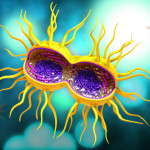Two pharmaceutical companies have made progress developing novel agents that can be used in place of Norvir (ritonavir) to boost other HIV drugs in the blood stream, according to two presentations Monday, February 9, at the 16th Conference on Retroviruses and Opportunistic Infections (CROI) in Montreal. Gilead Sciences, testing GS 9350, and Sequoia Pharmaceuticals, testing SPI-452, each presented data from two Phase I studies involving HIV-negative volunteers and are now planning to move these promising candidates into studies involving people living with HIV.
Pharmacokinetic (PK) boosters are important to HIV treatment. Norvir, a protease inhibitor, is used primarily to inhibit the cytochrome P450 enzyme system responsible for metabolizing a number of antiretrovirals (ARVs), thereby improving their effectiveness while reducing the number of pills and doses required on a daily basis. Norvir, however, is expensive, associated with side effects such as gastrointestinal problems and lipid increases, and may contribute to the emergence of drug-resistant virus due to the fact that it does have anti-HIV activity even at low doses. In turn, pharmaceutical companies have been eager to develop a safe and effective PK booster, without activity against HIV, that can be used in place of Norvir.
Gilead is developing GS 9350 primarily to boost blood levels of its experimental integrase inhibitor elvitegravir. Currently, elvitegravir must be taken twice a day; GS 9350 may allow for once-daily dosing. Gilead also plans to initiate studies of a four-in-one drug containing GS 9350-boosted elvitegravir plus emtricitabine (Emtriva) and tenofovir (Viread). It is not clear whether Gilead plans to study GS 9350 as a stand-alone agent for use in combination with non-Gilead ARVs.
SPI-452, Sequoia’s first HIV drug, is being developed as a stand-alone PK booster and for use in fixed-dose combinations with ARVs.
GS-9350 Phase I Studies
Results from the Phase I studies of GS 9350 were reported by Brian Kearney, PhD, of Gilead Sciences.
GS-216-0101 evaluated the safety and boosting capacity of GS 9350 compared with 100 mg Norvir—the typical booster dose when used with other protease inhibitors—or a placebo in HIV-negative volunteers during a 14-day period. Three doses of GS 9350 were evaluated: 50 mg, 100 mg and 200 mg once daily. All study participants also received midazolam, a sedative frequently used to evaluate drug interactions.
The 100 and 200 mg GS 9350 doses slowed the metabolism of midazolam by about 95 percent—on par with what is typically seen with Norvir.
Kearney also reported that both single and multiple doses of GS 9350 were well tolerated.
GS-236-0101, involving 33 HIV-negative study volunteers, explored safety and drug levels using fixed-dose tablets containing GS 9350, elvitegravir, emtricitabine and tenofovir. One version of the tablet contained 100 mg GS 9350; another contained 150 mg GS 9350. Both combination tablets were compared with a regimen containing Norvir-boosted elvitegravir plus Truvada (emtricitabine/tenofovir).
The combination tablet containing 150 mg GS 9350 resulted in elvitegravir blood levels comparable to Norvir-boosted elvitegravir. The study also verified that blood levels of tenofovir and emtricitabine were satisfactory.
As with the first Phase I study, the fixed-dose combination tablet containing GS 9350 was well tolerated. There was, however, one case of mild-to-moderate liver enzyme increases in one patient.
SPI-452 Phase I Studies
SPI-452 study results were reported by Robert Gutterndorf, PhD, of Sequoia Pharmaceuticals.
Study 0452-001, Sequoia’s first human study, enrolled 58 HIV-negative volunteers. In the study’s first part, Guttendorf and his colleagues tested single doses of SPI-452—25 mg, 50 mg, 100 mg, 200 mg, 400 mg or 600 mg—in combination with 1,000 mg Invirase (saquinavir), a protease inhibitor that requires boosting to be effective. In the study’s second part, the researchers tested two doses of SPI-452—50 mg or 200 mg—with 1,000 mg Invirase, compared with 1,000 mg Invirase used without boosting or placebo.
Across the board, Invirase levels increased substantially when used with SPI-452. Single-dose SPI-452, combined with Invirase, was also reported to be safe and well tolerated; no serious adverse effects were reported. Headache and sore throat were the two most common side effects documented in the study.
Study 0452-002, involving 67 HIV-negative individuals, evaluated multiple doses of SPI-452 in combination with the protease inhibitors Prezista (darunavir) and Reyataz (atazanavir). SPI-452 significantly increased blood levels of the protease inhibitors, ranging from a 13-fold increase in Reyataz blood levels to a 37-fold increase in Prezista blood levels.
SPI-452 was generally safe and well tolerated when dosed up to 200 mg once daily for 15 days. No volunteers discontinued the study because of the study drug, and no serious side effects were reported. Of the side effects reported in the study, the most common were headache, nausea, vomiting and diarrhea. Furthermore, there were no statistically significant changes in triglyceride and “bad” LDL cholesterol levels in volunteers receiving SPI-452 compared with the placebo.
Studies of GS 9350 and SPI-452, involving HIV-positive people, are planned.
Clarification (2/13/09): Gilead Sciences has informed AIDSmeds.com that it plans to study GS 9350 in combination with protease inhibitors manufactured by other pharmaceutical companies and that it has recently initiated a study with Bristol-Myers Squibb’s Reyataz (atazanavir).
Advertisement
Advertisement
Advertisement






Comments
Comments